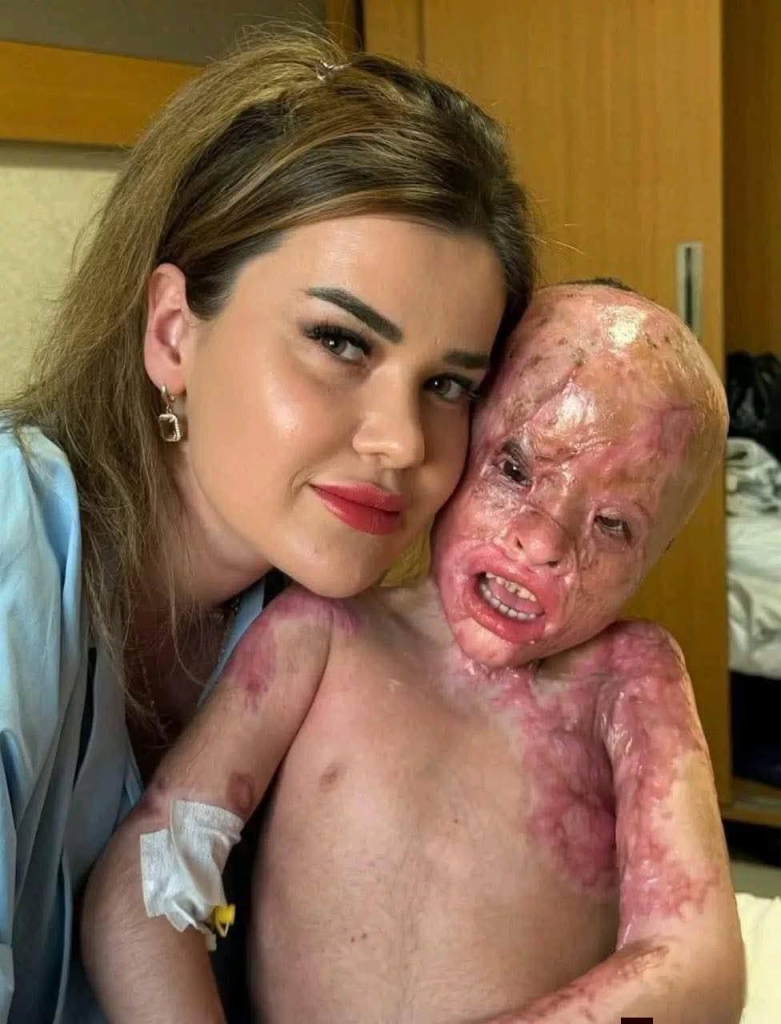
Yusuf continues to fight every day.
His body, scarred by burns, bears the marks of pain… but also of hope.
Although his treatments are still ongoing, I couldn’t resist sharing his current picture. Because behind every bandage, every tired look, there’s a boy who hasn’t stopped smiling at life.
Yusuf doesn’t give up. His strength inspires everyone around him, and his eyes reflect a courage that many adults would envy.
We know the road to recovery is long, filled with difficult days and sleepless nights. But we also know that prayer has power .
That’s why every word of encouragement, every positive thought, and every heartfelt prayer reaches him, giving him the strength he needs to keep going.
Today, more than ever, Yusuf needs the world to embrace him with faith.
Let each of us take a moment to wish him healing, comfort, and hope.
Because when many voices pray together, miracles happen.
And I am sure that, thanks to your prayers, Yusuf will soon smile again without pain.
Your Father, your Teacher, and your Physician is very strong and serene, for He does not remember our sins as long as we turn to Him. That is why Saint Augustine says: “Follow my advice; in sickness, remain at peace, for the suffering of the body is medicine for the soul. If you do not wish to know God through punishment, you will know that you will be punished in both soul and body.” This is a visit from God, and therefore you must accept it with a good heart; and if you do not have it, desire it with all your being, so that the health of the body does not become sickness of the soul.
Blind, says the saint, are those who, having been placed by God in poverty or suffering from illness, see the rich prosper in health, favors, and worldly pleasures, and are honored by all, and yet complain and murmur against God because He has not given them health, wealth, or worldly goods as He has given to the wicked. Thus says the prophet Jeremiah.
“Why does the way of the wicked prosper? Why does it go well for all who do evil?” (Jer. 12:1).
Therefore, the best advice for the sick is not to complain against God, but to first focus on receiving medicine for the soul. This is done by confessing sins and purifying the spirit before the body.
This is what Christ taught when he healed the paralytic: first he healed his soul by saying, “Your sins are forgiven” (John 5), and then he healed his body by saying, “Get up, take up your mat and walk.” Every action of Christ is an example and a lesson for us.
It is also advisable to encourage the sick person to make a will, disposing of their assets for the glory of God. Even if they are not due to die at that moment, this prudence will not harm them, but rather be of great help, both for the health of their body and soul, by ensuring they are always prepared.
Because he had shown himself to be ungrateful, God sent a very serious illness upon Hezekiah that brought him to the brink of death, and sent the prophet Isaiah to tell him:
In other words: put your house in order and prepare yourself, because you will die, and you will not live.
When Hezekiah received the threat from the enemy, divine providence was not ignored; that is, God wanted to rebuke him. Upon hearing the Lord’s words, Hezekiah turned to the wall and prayed to the Lord with great tears and weeping. As a result, God forgave him. Isaiah was quickly dispatched from Hezekiah’s palace, and the Lord told him:
“Go back and tell Hezekiah, the commander of my people: I have heard your prayer, I have seen your tears, and I have healed you; you will live fifteen more years, and I will deliver him from the hand of the king of Assyria, and I will defend your city.”
Hezekiah obeyed the Lord; on the third day he went to the temple to give thanks and sang this song:
“I said in the prime of my life, ‘I will go to the gates of the grave…’”
Thus one can see how much benefit the visit of Isaiah as messenger of God brought him: he obtained three great gifts: first, his years of life were increased; second, he was delivered from the power of his enemies; and third, he remained favored by God in all his outstanding endeavors.
The third teaching concerns those who visit the sick and give alms: they must remember their needs with charity and compassion. As St. John says in his first letter (1 John 3:17):
“If anyone has the world’s goods and sees his brother in need, yet closes his heart against him, how does God’s love abide in him?”
Gift baskets
If a rich person sees their neighbor sick and needy, and has no compassion, how can they have true charity toward God and others? Practically speaking, they will have neither love nor charity.
Therefore, the conclusion of this chapter is that the physician, before treating the sick person, should encourage them to confession. The sick person’s relatives and friends should comfort and encourage them to suffer for the love of God, thus purging their sins and benefiting from the fruits of their illness. Then, they should advise them to make a will and put their affairs in order. Finally, they should not fail to help and support them with alms according to each person’s ability, while fervently praying to God that His will be done.
As Saint James says in his letter (James 5:15):
“Prayer made with firm faith will heal the sick.”
Leave a Reply